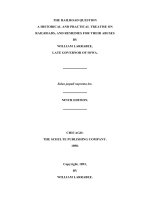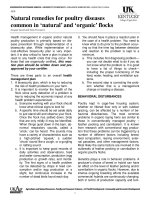Desperate remedies
Bạn đang xem bản rút gọn của tài liệu. Xem và tải ngay bản đầy đủ của tài liệu tại đây (1.46 MB, 356 trang )
TheProjectGutenbergEBookofDesperateRemedies,byThomasHardy
ThiseBookisfortheuseofanyoneanywhereatnocostandwith
almostnorestrictionswhatsoever.Youmaycopyit,giveitawayor
re-useitunderthetermsoftheProjectGutenbergLicenseincluded
withthiseBookoronlineatwww.gutenberg.org
Title:DesperateRemedies
Author:ThomasHardy
ReleaseDate:May25,2009[EBook#3044]
LastUpdated:October14,2016
Language:English
***STARTOFTHISPROJECTGUTENBERGEBOOKDESPERATEREMEDIES***
ProducedbyLesBowler,andDavidWidger
DESPERATEREMEDIES
ByThomasHardy
CONTENTS
PREFATORYNOTE
I.THEEVENTSOFTHIRTYYEARS
II.THEEVENTSOFAFORTNIGHT
III.THEEVENTSOFEIGHTDAYS
IV.THEEVENTSOFONEDAY
V.THEEVENTSOFONEDAY
VI.THEEVENTSOFTWELVEHOURS
VII.THEEVENTSOFEIGHTEENDAYS
VIII.THEEVENTSOFEIGHTEENDAYS
IX.THEEVENTSOFTENWEEKS
X.THEEVENTSOFADAYANDNIGHT
XI.THEEVENTSOFFIVEDAYS
XII.THEEVENTSOFTENMONTHS
XIII.THEEVENTSOFONEDAY
XIV.THEEVENTSOFFIVEWEEKS
XV.THEEVENTSOFTHREEWEEKS
XVI.THEEVENTSOFONEWEEK
XVII.THEEVENTSOFONEDAY
XVIII.THEEVENTSOFTHREEDAYS
XIX.THEEVENTSOFADAYANDNIGHT
XX.THEEVENTSOFTHREEHOURS
XXI.THEEVENTSOFEIGHTEENHOURS
SEQUEL
PREFATORYNOTE
The following story, the first published by the author, was written nineteen
years ago, at a time when he was feeling his way to a method. The principles
observed in its composition are, no doubt, too exclusively those in which
mystery, entanglement, surprise, and moral obliquity are depended on for
excitinginterest;butsomeofthescenes,andatleastoneofthecharacters,have
been deemed not unworthy of a little longer preservation; and as they could
hardlybereproducedinafragmentaryformthenovelisreissuedcomplete—the
more readily that it has for some considerable time been reprinted and widely
circulatedinAmerica.January1889.
To the foregoing note I have only to add that, in the present edition of
‘DesperateRemedies,’someWessextownsandotherplacesthatarecommonto
the scenes of several of these stories have been called for the first time by the
namesunderwhichtheyappearelsewhere,forthesatisfactionofanyreaderwho
maycareforconsistencyinsuchmatters.
Thisistheonlymaterialchange;for,asithappenedthatcertaincharacteristics
whichprovokedmostdiscussioninmylateststorywerepresentinthismyfirst
—published in 1871, when there was no French name for them it has seemed
besttoletthemstandunaltered.
T.H.February1896.
I.THEEVENTSOFTHIRTYYEARS
1.DECEMBERANDJANUARY,1835-36
In the long and intricately inwrought chain of circumstance which renders
worthyofrecordsomeexperiencesofCythereaGraye,EdwardSpringrove,and
others,thefirsteventdirectlyinfluencingtheissuewasaChristmasvisit.
In the above-mentioned year, 1835, Ambrose Graye, a young architect who
hadjustbegunthepracticeofhisprofessioninthemidlandtownofHocbridge,
to the north of Christminster, went to London to spend the Christmas holidays
withafriendwholivedinBloomsbury.TheyhadgoneuptoCambridgeinthe
sameyear,and,aftergraduatingtogether,Huntway,thefriend,hadtakenorders.
Graye was handsome, frank, and gentle. He had a quality of thought which,
exercised on homeliness, was humour; on nature, picturesqueness; on
abstractions,poetry.Being,asarule,broadcast,itwasallthree.
Ofthewickednessoftheworldhewastooforgetful.Todiscoverevilinanew
friend is to most people only an additional experience: to him it was ever a
surprise.
While in London he became acquainted with a retired officer in the Navy
namedBradleigh,who,withhiswifeandtheirdaughter,livedinastreetnotfar
from Russell Square. Though they were in no more than comfortable
circumstances,thecaptain’swifecameofanancientfamilywhosegenealogical
tree was interlaced with some of the most illustrious and well-known in the
kingdom.
Theyounglady,theirdaughter,seemedtoGrayebyfarthemostbeautifuland
queenly being he had ever beheld. She was about nineteen or twenty, and her
namewasCytherea.Intruthshewasnotsoveryunlikecountrygirlsofthattype
ofbeauty,exceptinonerespect.Shewasperfectinhermannerandbearing,and
they were not. A mere distinguishing peculiarity, by catching the eye, is often
read as the pervading characteristic, and she appeared to him no less than
perfectionthroughout—transcendingherruralrivalsinverynature.Grayedida
thingtheblissfulnessofwhichwasonlyeclipsedbyitshazardousness.Heloved
heratfirstsight.
HisintroductionshadledhimintocontactwithCythereaandherparentstwo
or three times on the first week of his arrival in London, and accident and a
lover’scontrivancebroughtthemtogetherasfrequentlytheweekfollowing.The
parents liked young Graye, and having few friends (for their equals in blood
were their superiors in position), he was received on very generous terms. His
passion for Cytherea grew not only strong, but ineffably exalted: she, without
positively encouraging him, tacitly assented to his schemes for being near her.
Her father and mother seemed to have lost all confidence in nobility of birth,
without money to give effect to its presence, and looked upon the budding
consequenceoftheyoungpeople’sreciprocalglanceswithplacidity,ifnotactual
favour.
Graye’s whole impassioned dream terminated in a sad and unaccountable
episode.Afterpassingthroughthreeweeksofsweetexperience,hehadarrived
at the last stage—a kind of moral Gaza—before plunging into an emotional
desert.ThesecondweekinJanuaryhadcomeround,anditwasnecessaryforthe
youngarchitecttoleavetown.
Throughouthisacquaintanceshipwiththeladyofhishearttherehadbeenthis
markedpeculiarityinherlove:shehaddelightedinhispresenceasasweetheart
should do, yet from first to last she had repressed all recognition of the true
nature of the thread which drew them together, blinding herself to its meaning
and only natural tendency, and appearing to dread his announcement of them.
The present seemed enough for her without cumulative hope: usually, even if
loveisinitselfanend,itmustberegardedasabeginningtobeenjoyed.
Inspiteofevasionsasanobstacle,andinconsequenceofthemasaspur,he
would put the matter off no longer. It was evening. He took her into a little
conservatoryonthelanding,andthereamongthe evergreens, bythe light ofa
few tinylamps,infinitelyenhancingthefreshnessand beautyoftheleaves,he
madethedeclarationofaloveasfreshandbeautifulasthey.
‘Mylove—mydarling,bemywife!’
Sheseemedlikeonejustawakened.‘Ah—wemustpartnow!’shefaltered,in
avoiceofanguish.‘Iwillwritetoyou.’Sheloosenedherhandandrushedaway.
In a wild fever Graye went home and watched for the next morning. Who
shallexpresshismiseryandwonderwhenanotecontainingthesewordswasput
intohishand?
‘Good-bye; good-bye for ever. As recognized lovers something divides us
eternally.Forgiveme—Ishouldhavetoldyoubefore;butyourlovewassweet!
Nevermentionme.’
Thatveryday,andasitseemed,toputanendtoapainfulconditionofthings,
daughter and parents left London to pay off a promised visit to a relative in a
western county. No message or letter of entreaty could wring from her any
explanation.Shebeggedhimnottofollowher,andthemostbewilderingpoint
wasthatherfatherandmotherappeared,fromthetoneofaletterGrayereceived
from them, as vexed and sad as he at this sudden renunciation. One thing was
plain: without admitting her reason as valid, they knew what that reason was,
anddidnotintendtorevealit.
A week from that day Ambrose Graye left his friend Huntway’s house and
sawnomoreoftheLovehemourned.Fromtimetotimehisfriendansweredany
inquiry Graye made by letter respecting her. But very poor food to a lover is
intelligence of a mistress filtered through a friend. Huntway could tell nothing
definitely. He said he believed there had been some prior flirtation between
Cythereaandhercousin,anofficeroftheline,twoorthreeyearsbeforeGraye
mether,whichhadsuddenlybeenterminatedbythecousin’sdepartureforIndia,
andtheyounglady’stravellingontheContinentwithherparentsthewholeof
theensuingsummer,onaccountofdelicatehealth.EventuallyHuntwaysaidthat
circumstances had rendered Graye’s attachment more hopeless still. Cytherea’s
mother had unexpectedly inherited a large fortune and estates in the west of
England by the rapid fall of some intervening lives. This had caused their
removalfromthesmallhouseinBloomsbury,and,asitappeared,arenunciation
oftheiroldfriendsinthatquarter.
YoungGrayeconcludedthathisCythereahadforgottenhimandhislove.But
hecouldnotforgether.
2.FROM1843TO1861
Eightyearslater,feelinglonelyanddepressed—amanwithoutrelatives,with
many acquaintances but no friends—Ambrose Graye met a young lady of a
different kind, fairly endowed with money and good gifts. As to caring very
deeply for another woman after the loss of Cytherea, it was an absolute
impossibilitywithhim.Withall,thebeautifulthingsoftheearthbecomemore
dearastheyeludepursuit;butwithsomenaturesutterelusionistheonespecial
eventwhichwillmakeapassinglovepermanentforever.
ThissecondyoungladyandGrayeweremarried.Thathedidnot,firstorlast,
lovehiswifeasheshouldhavedone,wasknowntoall;butfewknewthathis
unmanageableheartcouldneverbeweanedfromuselessrepiningatthelossof
itsfirstidol.
His character to some extent deteriorated, as emotional constitutions will
underthelongsenseofdisappointmentathavingmissedtheirimagineddestiny.
Andthus,thoughnaturallyofagentleandpleasantdisposition,hegrewtobenot
sotenderlyregardedbyhisacquaintancesasitisthelotofsomeofthosepersons
to be. The winning and sanguine receptivity of his early life developed by
degrees a moody nervousness, and when not picturing prospects drawn from
baselesshopehewasthevictimofindescribabledepression.Thepracticalissue
of such a condition was improvidence, originally almost an unconscious
improvidence, for every debt incurred had been mentally paid off with a
religious exactness from the treasures of expectation before mentioned. But as
yearsrevolved,thesamecoursewascontinuedfromthelackofspiritsufficient
forshiftingoutofanoldgroovewhenithasbeenfoundtoleadtodisaster.
Intheyear1861hiswifedied,leavinghimawidowerwithtwochildren.The
elder,asonnamedOwen,nowjustturnedseventeen,wastakenfromschool,and
initiated as pupil to the profession of architect in his father’s office. The
remainingchildwasadaughter,andOwen’sjuniorbyayear.
HerchristiannamewasCytherea,anditiseasytoguesswhy.
3.OCTOBERTHETWELFTH,1863
We pass over two years in order to reach the next cardinal event of these
persons’lives.ThesceneisstilltheGrayes’nativetownofHocbridge,butasit
appearedonaMondayafternooninthemonthofOctober.
The weather was sunny and dry, but the ancient borough was to be seen
wearing one of its least attractive aspects. First on account of the time. It was
that stagnant hour of the twenty-four when the practical garishness of Day,
having escaped from the fresh long shadows and enlivening newness of the
morning, has not yet made any perceptible advance towards acquiring those
mellowandsoothingtoneswhichgraceitsdecline.Next,itwasthatstageinthe
progressoftheweekwhenbusiness—which,carriedonunderthegablesofan
old country place, is not devoid of a romantic sparkle—was well-nigh
extinguished. Lastly, the town was intentionally bent upon being attractive by
exhibiting to an influx of visitors the local talent for dramatic recitation, and
provincialtownstryingtobelivelyarethedullestofdullthings.
Littletownsarelikelittlechildreninthisrespect,thattheyinterestmostwhen
they are enacting native peculiarities unconscious of beholders. Discovering
themselvestobewatchedtheyattempttobeentertainingbyputtingonanantic,
andproducedisagreeablecaricatureswhichspoilthem.
The weather-stained clock-face in the low church tower standing at the
intersectionofthethreechiefstreetswasexpressinghalf-pasttwototheTown
Hallopposite,wherethemuchtalked-ofreadingfromShakespearewasaboutto
begin. The doors were open, and those persons who had already assembled
within the building were noticing the entrance of the new-comers—silently
criticizing their dress—questioning the genuineness of their teeth and hair—
estimatingtheirprivatemeans.
Amongtheselateronescameanexceptionalyoungmaidenwhoglowedamid
thedulnesslikeasinglebright-redpoppyinafieldofbrownstubble.Shewore
anelegantdarkjacket,lavenderdress,hatwithgreystringsandtrimmings,and
glovesofacolourtoharmonize.Shelightlywalkedupthesidepassageofthe
room,castaslightglancearound,andenteredtheseatpointedouttoher.
TheyounggirlwasCythereaGraye;heragewasnowabouteighteen.During
herentry,andatvarioustimeswhilstsittinginherseatandlisteningtothereader
ontheplatform,herpersonalappearanceformedaninterestingsubjectofstudy
forseveralneighbouringeyes.
Her face was exceedingly attractive, though artistically less perfect than her
figure, which approached unusually near to the standard of faultlessness. But
eventhisfeatureofhersyieldedthepalmtothegracefulnessofhermovement,
whichwasfascinatinganddelightfultoanextremedegree.
Indeed,motionwasherspeciality,whethershownonitsmostextendedscale
ofbodilyprogression,orminutely,asintheupliftingofhereyelids,thebending
ofherfingers,thepoutingofherlip.Thecarriageofherhead—motionwithin
motion—aglideuponaglide—wasasdelicateasthatofamagneticneedle.And
this flexibility and elasticity had never been taught her by rule, nor even been
acquiredbyobservation,but,nullocultu,hadnaturallydevelopeditselfwithher
years. In childhood, a stone or stalk in the way, which had been the inevitable
occasionofafalltoherplaymates,hadusuallylefthersafeanduprightonher
feetafterthenarrowestescapebyoscillationsandwhirlsforthepreservationof
her balance. At mixed Christmas parties, when she numbered but twelve or
thirteen years, and was heartily despised on that account by lads who deemed
themselves men, her apt lightness in the dance covered this incompleteness in
her womanhood, and compelled the self-same youths in spite of resolutions to
seize upon her childish figure as a partner whom they could not afford to
contemn. And in later years, when the instincts of her sex had shown her this
point as the best and rarest feature in her external self, she was not found
wantinginattentiontothecultivationoffinishinitsdetails.
Her hair rested gaily upon her shoulders in curls and was of a shining corn
yellowinthehighlights,deepeningtoadefinitenut-brownaseachcurlwound
roundintotheshade.Shehadeyesofasapphirehue,thoughratherdarkerthan
thegemordinarilyappears;theypossessedtheaffectionateandliquidsparkleof
loyalty and good faith as distinguishable from that harder brightness which
seemstoexpressfaithfulnessonlytotheobjectconfrontingthem.
Buttoattempttogainaviewofher—orindeedofanyfascinatingwoman—
fromameasuredcategory,isasdifficultastoappreciatetheeffectofalandscape
byexploringitatnightwithalantern—orofafullchordofmusicbypipingthe
notesinsuccession.Neverthelessitmayreadilybebelievedfromthedescription
here ventured, that among the many winning phases of her aspect, these were
particularlystriking:—
Duringpleasantdoubt,whenhereyesbrightenedstealthilyand
smiled(aseyeswillsmile)asdistinctlyasherlips,andinthe
spaceofasingleinstantexpressedclearlythewholeroundof
degreesofexpectancywhichlieoverthewideexpansebetweenYea
andNay.
Duringthetellingofasecret,whichwasinvoluntarily
accompaniedbyasuddenminutestart,andecstaticpressureof
thelistener’sarm,side,orneck,asthepositionanddegree
ofintimacydictated.
Whenanxiouslyregardingonewhopossessedheraffections.
She suddenly assumed the last-mentioned bearing in the progress of the
presententertainment.Herglancewasdirectedoutofthewindow.
Why the particulars of a young lady’s presence at a very mediocre
performance were prevented from dropping into the oblivion which their
intrinsic insignificance would naturally have involved—why they were
rememberedandindividualizedbyherselfandothersthroughafteryears—was
simplythatsheunknowinglystood,asitwere,upontheextremeposterioredge
of a tract in her life, in which the real meaning of Taking Thought had never
been known. It was the last hour of experience she ever enjoyed with a mind
entirely free from a knowledge of that labyrinth into which she stepped
immediatelyafterwards—tocontinueaperplexedcoursealongitsmazesforthe
greaterportionoftwenty-ninesubsequentmonths.
The Town Hall, in which Cytherea sat, was a building of brown stone, and
through one of the windows could be seen from the interior of the room the
housetops and chimneys of the adjacent street, and also the upper part of a
neighbouring church spire, now in course of completion under the
superintendenceofMissGraye’sfather,thearchitecttothework.
Thatthetopofthisspireshouldbevisiblefromherpositionintheroomwasa
fact which Cytherea’s idling eyes had discovered with some interest, and she
was now engaged in watching the scene that was being enacted about its airy
summit.Roundtheconicalstoneworkroseacageofscaffoldingagainsttheblue
sky,anduponthisstoodfivemen—fourinclothesaswhiteasthenewerection
closebeneaththeirhands,thefifthintheordinarydarksuitofagentleman.
The four working-men in white were three masons and a mason’s labourer.
Thefifthmanwasthearchitect,Mr.Graye.Hehadbeengivingdirectionsasit
seemed,andretiringasfarasthenarrowfootwayallowed,stoodperfectlystill.
The picture thus presented to a spectator in the Town Hall was curious and
striking. It was an illuminated miniature, framed in by the dark margin of the
window,thekeen-edgedshadinessofwhichemphasizedbycontrastthesoftness
oftheobjectsenclosed.
Theheightofthespirewasaboutonehundredandtwentyfeet,andthefive
menengagedthereonseemedentirelyremovedfromthesphereandexperiences
of ordinary human beings. They appeared little larger than pigeons, and made
theirtinymovementswithasoft,spirit-likesilentness.Oneideaaboveallothers
was conveyed to the mind of a person on the ground by their aspect, namely,
concentrationofpurpose:thattheywereindifferentto—evenunconsciousof—
the distracted world beneath them, and all that moved upon it. They never
lookedoffthescaffolding.
Thenoneofthemturned;itwasMr.Graye.Againhestoodmotionless,with
attentiontotheoperationsoftheothers.Heappearedtobelostinreflection,and
haddirectedhisfacetowardsanewstonetheywerelifting.
‘Why does he stand like that?’ the young lady thought at length—up to that
momentaslistlessandcarelessasoneoftheancientTarentines,who,onsuchan
afternoon as this, watched from the Theatre the entry into their Harbour of a
powerthatoverturnedtheState.
She moved herself uneasily. ‘I wish he would come down,’ she whispered,
stillgazingattheskybackedpicture.‘Itissodangeroustobeabsent-mindedup
there.’
Whenshehaddonemurmuringthewordsherfatherindecisivelylaidholdof
oneofthescaffold-poles,asiftotestitsstrength,thenletitgoandsteppedback.
Instepping,hisfootslipped.Aninstantofdoublingforwardandsideways,and
hereeledoffintotheair,immediatelydisappearingdownwards.
His agonized daughter rose to her feet by a convulsive movement. Her lips
parted, and she gasped for breath. She could utter no sound. One by one the
people about her, unconscious of what had happened, turned their heads, and
inquiryandalarmbecamevisibleupontheirfacesatthesightofthepoorchild.
Amomentlonger,andshefelltothefloor.
ThenextimpressionofwhichCythereahadanyconsciousnesswasofbeing
carriedfromastrangevehicleacrossthepavementtothestepsofherownhouse
byherbrotherandanolderman.Recollectionofwhathadpassedevolveditself
an instant later, and just as they entered the door—through which another and
sadderburdenhadbeencarriedbutafewinstantsbefore—hereyescaughtsight
of the south-western sky, and, without heeding, saw white sunlight shining in
shaft-like lines from a rift in a slaty cloud. Emotions will attach themselves to
scenesthataresimultaneous—howeverforeigninessencethesescenesmaybe
—as chemical waters will crystallize on twigs and wires. Even after that time
any mental agony brought less vividly to Cytherea’s mind the scene from the
TownHallwindowsthansunlightstreaminginshaft-likelines.
4.OCTOBERTHENINETEENTH
When death enters a house, an element of sadness and an element of horror
accompany it. Sadness, from the death itself: horror, from the clouds of
blacknesswedesignedlylabourtointroduce.
Thefuneralhadtakenplace.Depressed,yetresolvedinhisdemeanour,Owen
Graye sat before his father’s private escritoire, engaged in turning out and
unfoldingaheterogeneouscollectionofpapers—forbiddingandinharmoniousto
the eye at all times—most of all to one under the influence of a great grief.
Laminae of white paper tied with twine were indiscriminately intermixed with
otherwhitepapersboundedbyblackedges—thesewithbluefoolscapwrapped
roundwithcruderedtape.
The bulk of these letters, bills, and other documents were submitted to a
carefulexamination,bywhichtheappendedparticularswereascertained:—
First,thattheirfather’sincomefromprofessionalsourceshad
beenverysmall,amountingtonotmorethanhalftheirexpenditure;
andthathisownandhiswife’sproperty,uponwhichhehadrelied
forthebalance,hadbeensunkandlostinunwiseloansto
unscrupulousmen,whohadtradedupontheirfather’stoo
open-heartedtrustfulness.
Second,thatfindinghismistake,hehadendeavouredtoregain
hisstandingbytheillusorypathofspeculation.Themostnotable
instanceofthiswasthefollowing.Hehadbeeninduced,whenat
Plymouthintheautumnofthepreviousyear,toventureallhis
sparecapitalonthebottomrysecurityofanItalianbrigwhich
hadputintotheharbourindistress.Theprofitwastobe
considerable,sowastherisk.Thereturnedouttobenosecurity
whatever.Thecircumstancesofthecasetendereditthemost
unfortunatespeculationthatamanlikehimself—ignorantofall
suchmatters—couldpossiblyengagein.Thevesselwentdown,and
allMr.Graye’smoneywithit.
Third,thatthesefailureshadlefthimburdenedwithdebtshe
knewnothowtomeet;sothatatthetimeofhisdeatheventhefew
poundslyingtohisaccountatthebankwerehisonlyinname.
Fourth,thatthelossofhiswifetwoyearsearlierhad
awakenedhimtoakeensenseofhisblindness,andofhisdutyby
hischildren.Hehadthenresolvedtoreinstatebyunflaggingzeal
inthepursuitofhisprofession,andbynospeculation,atleasta
portionofthelittlefortunehehadletgo.
Cytherea was frequently at her brother’s elbow during these examinations.
Sheoftenremarkedsadly—
‘Poor papa failed to fulfil his good intention for want of time, didn’t he,
Owen?Andtherewasanexcuseforhispast,thoughheneverwouldclaimit.I
neverforgetthatoriginaldishearteningblow,andhowthatfromitsprangallthe
ills of his life—everything connected with his gloom, and the lassitude in
businessweusedsooftentoseeabouthim.’
‘Irememberwhathesaidonce,’returnedthebrother,‘whenIsatuplatewith
him.Hesaid,“Owen,don’tlovetooblindly:blindlyyouwillloveifyouloveat
all,butalittlecareisstillpossibletoawell-disciplinedheart.Maythatheartbe
yoursasitwasnotmine,”fathersaid.“Cultivatetheartofrenunciation.”AndI
amgoingto,Cytherea.’
‘Andoncemammasaidthatanexcellentwomanwaspapa’sruin,becausehe
didnotknowthewaytogiveherupwhenhehadlosther.Iwonderwheresheis
now,Owen?Weweretoldnottotrytofindoutanythingabouther.Papanever
toldushername,didhe?’
‘Thatwasbyherownrequest,Ibelieve.Butnevermindher;shewasnotour
mother.’
The love affair which had been Ambrose Graye’s disheartening blow was
preciselyofthatnaturewhichladstakelittleaccountof,butgirlsponderintheir
hearts.
5.FROMOCTOBERTHENINETEENTHTOJULYTHENINTH
ThusAmbroseGraye’sgoodintentionswithregardtothereintegrationofhis
property had scarcely taken tangible form when his sudden death put them for
everoutofhispower.
Heavy bills, showing the extent of his obligations, tumbled in immediately
upontheheelsofthefuneralfromquarterspreviouslyunheardandunthoughtof.
Thuspressed,abillwasfiledinChancerytohavetheassets,suchastheywere,
administeredbytheCourt.
‘Whatwillbecomeofusnow?’thoughtOwencontinually.
There is in us an unquenchable expectation, which at the gloomiest time
persistsininferringthatbecauseweareourselves,theremustbeaspecialfuture
instoreforus,thoughournatureandantecedentstotheremotestparticularhave
beencommontothousands.ThustoCythereaandOwenGrayethequestionhow
their lives would end seemed the deepest of possible enigmas. To others who
knew their position equally well with themselves the question was the easiest
thatcouldbeasked—‘Likethoseofotherpeoplesimilarlycircumstanced.’
Then Owen held a consultation with his sister to come to some decision on
theirfuturecourse,andamonthwaspassedinwaitingforanswerstoletters,and
in the examination of schemes more or less futile. Sudden hopes that were
rainbowstothesightprovedbutmiststothetouch.Inthemeantime,unpleasant
remarks, disguise them as some well-meaning people might, were floating
around them every day. The undoubted truth, that they were the children of a
dreamerwholetslipawayeveryfarthingofhismoneyandranintodebtwithhis
neighbours—that the daughter had been brought up to no profession—that the
sonwhohad,hadmadenoprogressinit,andmightcometothedogs—couldnot
fromthenatureofthingsbewrappedupinsilenceinorderthatitmightnothurt
theirfeelings;andasamatteroffact,itgreetedtheirearsinsomeformorother
wherever they went. Their few acquaintances passed them hurriedly. Ancient
pot-wallopers, and thriving shopkeepers, in their intervals of leisure, stood at
theirshop-doors—their toeshangingovertheedge ofthe step,and theirobese
waistshangingovertheirtoes—andindiscourseswithfriendsonthepavement,
formulatedthecourseoftheimprovident,andreducedthechildren’sprospectsto
a shadow-like attenuation. The sons of these men (who wore breastpins of a
sarcastic kind, and smoked humorous pipes) stared at Cytherea with a stare
unmitigatedbyanyoftherespectthathadformerlysoftenedit.
Nowitisanoticeablefactthatwedonotmuchmindwhatmenthinkofus,or
what humiliating secret they discover of our means, parentage, or object,
provided that each thinks and acts thereupon in isolation. It is the exchange of
ideas about us that we dread most; and the possession by a hundred
acquaintances, severally insulated, of the knowledge of our skeleton-closet’s
whereabouts, is not so distressing to the nerves as a chat over it by a party of
half-a-dozen—exclusivedepositariesthoughthesemaybe.
Perhaps, though Hocbridge watched and whispered, its animus would have
been little more than a trifle to persons in thriving circumstances. But
unfortunately, poverty, whilst it is new, and before the skin has had time to
thicken, makes people susceptible inversely to their opportunities for shielding
themselves.InOwenwasfound,inplaceofhisfather’simpressibility,alarger
shareofhisfather’spride,andasquarenessofideawhich,ifcoupledwithalittle
more blindness, would have amounted to positive prejudice. To him humanity,
sofarashehadthoughtofitatall,wasratherdividedintodistinctclassesthan
blendedfromextremetoextreme.Hencebyasequenceofideaswhichmightbe
traced if it were worth while, he either detested or respected opinion, and
instinctively sought to escape a cold shade that mere sensitiveness would have
endured. He could have submitted to separation, sickness, exile, drudgery,
hungerandthirst,withstoicalindifference,butsuperciliousnesswastooincisive.
Afterlivingonforninemonthsinattemptstomakeanincomeashisfather’s
successorintheprofession—attemptswhichwereutterlyfruitlessbyreasonof
hisinexperience—Grayecametoasimpleandsweepingresolution.Theywould
privately leave that part of England, drop from the sight of acquaintances,
gossips, harsh critics, and bitter creditors of whose misfortune he was not the
cause, and escape the position which galled him by the only road their great
povertyleftopentothem—thatofhisobtainingsomeemploymentinadistant
placebyfollowinghisprofessionasahumbleunder-draughtsman.
Hethoughtoverhiscapabilitieswiththesensationsofasoldiergrindinghis
swordattheopeningofacampaign.Whatwithlackofemployment,owingto
the decrease of his late father’s practice, and the absence of direct and
uncompromisingpressuretowardsmonetaryresultsfromapupil’slabour(which
seems to be always the case when a professional man’s pupil is also his son),
Owen’s progress in the art and science of architecture had been very
insignificant indeed. Though anything but an idle young man, he had hardly
reached the age at which industrious men who lack an external whip to send
them on in the world, are induced by their own common sense to whip on
themselves. Hence his knowledge of plans, elevations, sections, and
specifications, was not greater at the end of two years of probation than might
easilyhavebeenacquiredinsixmonthsbyayouthofaverageability—himself,
forinstance—amidabustlingLondonpractice.
Butatanyratehecouldmakehimselfhandytooneoftheprofession—some
man in a remote town—and there fulfil his indentures. A tangible inducement
layinthisdirectionofsurvey.Hehadaslightconceptionofsuchaman—aMr.
Gradfield—who was in practice in Budmouth Regis, a seaport town and
watering-placeinthesouthofEngland.
After some doubts, Graye ventured to write to this gentleman, asking the
necessary question, shortly alluding to his father’s death, and stating that his
termofapprenticeshiphadonlyhalfexpired.Hewouldbegladtocompletehis
articles at a very low salary for the whole remaining two years, provided
paymentcouldbeginatonce.
TheanswerfromMr.Gradfieldstatedthathewasnotinwantofapupilwho
wouldservetheremainderofhistimeonthetermsMr.Grayementioned.Buthe
wouldjustaddoneremark.Hechancedtobeinwantofsomeyoungmaninhis
office—for a short time only, probably about two months—to trace drawings,
andattendtoothersubsidiaryworkofthekind.IfMr.Grayedidnotobjectto
occupy such an inferior position as these duties would entail, and to accept
weekly wages which to one with his expectations would be considered merely
nominal,thepostwouldgivehimanopportunityforlearningafewmoredetails
oftheprofession.
‘Itisabeginning,and,aboveall,anabiding-place,awayfromtheshadowof
thecloudwhichhangsoverushere—Iwillgo,’saidOwen.
Cytherea’s plan for her future, an intensely simple one, owing to the even
greaternarrownessofherresources,wasalreadymarkedout.Oneadvantagehad
accrued to her through her mother’s possession of a fair share of personal
property, and perhaps only one. She had been carefully educated. Upon this
considerationherplanwasbased.Shewastotakeupherabodeinherbrother’s
lodgingatBudmouth,whenshewouldimmediatelyadvertiseforasituationas
governess, having obtained the consent of a lawyer at Aldbrickham who was
winding up her father’s affairs, and who knew the history of her position, to
allowhimselftobereferredtointhematterofherpastlifeandrespectability.
Earlyonemorningtheydepartedfromtheirnativetown,leavingbehindthem
scarcelyatraceoftheirfootsteps.
Thenthetownpitiedtheirwantofwisdomintakingsuchastep.‘Rashness;
they would have made a better income in Hocbridge, where they are known!
Thereisnodoubtthattheywould.’
But what is Wisdom really? A steady handling of any means to bring about
anyendnecessarytohappiness.
Yetwhetherone’sendbetheusualend—awealthypositioninlife—orno,the
nameofwisdomisseldomappliedbuttothemeanstothatusualend.
II.THEEVENTSOFAFORTNIGHT
1.THENINTHOFJULY
Thedayoftheirdeparturewasoneofthemostglowingthattheclimaxofa
long series of summer heats could evolve. The wide expanse of landscape
quiveredupanddownliketheflameofataper,astheysteamedalongthrough
the midst of it. Placid flocks of sheep reclining under trees a little way off
appearedofapalebluecolour.Cloverfieldswerelividwiththebrightnessofthe
sunupontheirdeepredflowers.Allwaggonsandcartsweremovedtotheshade
by their careful owners, rain-water butts fell to pieces; well-buckets were
loweredinsidethecoversofthewell-hole,topreservethemfromthefateofthe
butts,andgenerally,waterseemedscarcerinthecountrythanthebeerandcider
ofthepeasantrywhotoiledoridledthere.
Toseepersonslookingwithchildren’seyesatanyordinaryscenery,isaproof
that they possess the charming faculty of drawing new sensations from an old
experience—a healthy sign, rare in these feverish days—the mark of an
imperishablebrightnessofnature.
Bothbrotherandsistercoulddothis;Cythereamorenoticeably.Theywatched
the undulating corn-lands, monotonous to all their companions; the stony and
clayeyprospectsucceedingthose,withitsangularandabrupthills.Boggymoors
came next, now withered and dry—the spots upon which pools usually spread
their waters showing themselves as circles of smooth bare soil, over-run by a
net-work of innumerable little fissures. Then arose plantations of firs, abruptly
terminatingbesidemeadowscleanlymown,inwhichhigh-hipped,rich-coloured
cows, with backs horizontal and straight as the ridge of a house, stood
motionlessorlazilyfed.Glimpsesoftheseanowinterestedthem,whichbecame
more and more frequent till the train finally drew up beside the platform at
Budmouth.
‘The whole town is looking out for us,’ had been Graye’s impression
throughouttheday.HecalleduponMr.Gradfield—theonlymanwhohadbeen
directlyinformedofhiscoming—andfoundthatMr.Gradfieldhadforgottenit.
However,arrangementsweremadewiththisgentleman—astout,active,greybeardedburgherofsixty—bywhichOwenwastocommenceworkinhisoffice
thefollowingweek.
ThesamedayCythereadrewupandsentofftheadvertisementappended:—
‘AYOUNGLADYisdesirousofmeetingwithanengagementas
governessorcompanion.SheiscompetenttoteachEnglish,
French,andMusic.Satisfactoryreferences—Address,C.G.,
Post-Office,Budmouth.’
Itseemedamorematerialexistencethanherownthatshesawthusdelineated
onthepaper.‘Thatcan’tbemyself;howoddIlook!’shesaid,andsmiled.
2.JULYTHEELEVENTH
On the Monday subsequent to their arrival in Budmouth, Owen Graye
attendedatMr.Gradfield’sofficetoenteruponhisduties,andhissisterwasleft
intheirlodgingsaloneforthefirsttime.
Despite the sad occurrences of the preceding autumn, an unwonted
cheerfulnesspervadedherspiritthroughouttheday.Changeofscene—andthat
tountravelledeyes—conjoinedwiththesensationoffreedomfromsupervision,
revivedthesparkleofawarmyoungnaturereadyenoughtotakeadvantageof
anyadventitiousrestoratives.Point-blankgrieftendsrathertosealuphappiness
foratimethantoproducethatattritionwhichresultsfromgriefsofanticipation
thatmoveonwardwiththedays:thesemaybesaidtofurrowawaythecapacity
forpleasure.
Herexpectationsfromtheadvertisementbegantobeextravagant.Athriving
family,whohadalwayssadlyneededher,wasalreadydefinitelypicturedinher
fancy,which,initsexuberance,ledherontopicturingitsindividualmembers,
their possible peculiarities, virtues, and vices, and obliterated for a time the
recollectionthatshewouldbeseparatedfromherbrother.
Thusmusing,asshewaitedforhisreturnintheevening,hereyesfellonher
left hand. The contemplation of her own left fourth finger by symbol-loving
girlhood of this age is, it seems, very frequently, if not always, followed by a
peculiar train of romantic ideas. Cytherea’s thoughts, still playing about her
future, became directed into this romantic groove. She leant back in her chair,
andtakingholdofthefourthfinger,whichhadattractedherattention,shelifted
itwiththetipsoftheothers,andlookedatthesmoothandtaperingmemberfora
longtime.
Shewhisperedidly,‘Iwonderwhoandwhathewillbe?
‘Ifhe’sagentlemanoffashion,hewilltakemyfingerso,justwiththetipsof
hisown,andwithsomeflutteringoftheheart,andtheleasttremblingofhislip,
slip the ring so lightly on that I shall hardly know it is there—looking
delightfullyintomyeyesallthetime.
‘Ifhe’sabold,dashingsoldier,Iexpecthewillproudlyturnround,takethe
ringasifitequalledherMajesty’scrowninvalue,anddesperatelysetitonmy
fingerthus.Hewillfixhiseyesunflinchinglyuponwhatheisdoing—justasif
he stood in battle before the enemy (though, in reality, very fond of me, of
course),andblushasmuchasIshall.
‘Ifhe’sasailor,hewilltakemyfingerandtheringinthisway,anddeckitout
with a housewifely touch and a tenderness of expression about his mouth, as
sailorsdo:kissit,perhaps,withasimpleair,asifwewerechildrenplayingan
idlegame,andnotattheveryheightofobservationandenvybyagreatcrowd
saying,“Ah!theyarehappynow!”
‘Ifheshouldberatherapoorman—noble-minded andaffectionate,butstill
poor—’
Owen’s footsteps rapidly ascending the stairs, interrupted this fancy-free
meditation.Reproachingherself,evenangrywithherselfforallowinghermind
tostrayuponsuchsubjectsinthefaceoftheirpresentdesperatecondition,she
rosetomeethim,andmaketea.
Cytherea’s interest to know how her brother had been received at Mr.
Gradfield’sbrokeforthintowordsatonce.Almostbeforetheyhadsatdownto
table,shebegancross-examininghimintheregularsisterlyway.
‘Well, Owen, how has it been with you to-day? What is the place like—do
youthinkyouwilllikeMr.Gradfield?’
‘O yes. But he has not been there to-day; I have only had the head
draughtsmanwithme.’
Young women have a habit, not noticeable in men, of putting on at a
moment’snoticethedramaofwhosoever’slifetheychoose.Cytherea’sinterest
wastransferredfromMr.Gradfieldtohisrepresentative.
‘Whatsortofamanishe?’
‘Heseemsaverynicefellowindeed;thoughofcourseIcanhardlytelltoa
certainty as yet. But I think he’s a very worthy fellow; there’s no nonsense in
him, and though he is not a public school man he has read widely, and has a
sharpappreciationofwhat’sgoodinbooksandart.Infact,hisknowledgeisn’t
nearlysoexclusiveasmostprofessionalmen’s.’
‘That’sagreatdealtosayofanarchitect,forofallprofessionalmentheyare,
asarule,themostprofessional.’
‘Yes; perhaps they are. This man is rather of a melancholy turn of mind, I
think.’
‘Hasthemanagingclerkanyfamily?’shemildlyasked,afterawhile,pouring
outsomemoretea.
‘Family;no!’
‘Well,dearOwen,howshouldIknow?’
‘Why, of course he isn’t married. But there happened to be a conversation
aboutwomengoingonintheoffice,andIheardhimsaywhatheshouldwishhis
wifetobelike.’
‘Whatwouldhewishhiswifetobelike?’shesaid,withgreatapparentlackof
interest.
‘O,hesaysshemustbegirlishandartless:yethewouldbelothtodowithout
adashofwomanlysubtlety,‘tissopiquant.Yes,hesaid,thatmustbeinher;she
must have womanly cleverness. “And yet I should like her to blush if only a
cock-sparrowweretolookatherhard,”hesaid,“whichbringsmebacktothe
girl again: and so I flit backwards and forwards. I must have what comes, I
suppose,” he said, “and whatever she may be, thank God she’s no worse.
However,ifhemightgiveafinalhinttoProvidence,”hesaid,“achildamong
pleasures,andawomanamongpainswastheroughoutlineofhisrequirement.”’
‘Didhesaythat?Whatamusingcreaturehemustbe.’
‘Hedid,indeed.’
3.FROMTHETWELFTHTOTHEFIFTEENTHOFJULY
As is well known, ideas are so elastic in a human brain, that they have no
constantmeasurewhichmaybecalledtheiractualbulk.Anyimportantideamay
becompressedtoamoleculebyanunwontedcrowdingofothers;andanysmall
idea will expand to whatever length and breadth of vacuum the mind may be
abletomakeovertoit.Cytherea’sworldwastolerablyvacantatthistime,and
the young architectural designer’s image became very pervasive. The next
eveningthissubjectwasagainrenewed.
‘HisnameisSpringrove,’saidOwen,inreplytoher.‘Heisathoroughartist,
butamanofratherhumbleorigin,itseems,whohasmadehimselfsofar.Ithink
heisthesonofafarmer,orsomethingofthekind.’
‘Well,he’snonetheworseforthat,Isuppose.’
‘Nonetheworse.Aswecomedownthehill,weshallbecontinuallymeeting
people going up.’ But Owen had felt that Springrove was a little the worse
nevertheless.
‘Ofcoursehe’sratheroldbythistime.’
‘Ono.He’saboutsix-and-twenty—notmore.’
‘Ah,Isee....Whatishelike,Owen?’
‘I can’t exactly tell you his appearance: ‘tis always such a difficult thing to
do.’
‘Amanyouwoulddescribeasshort?Mostmenarethoseweshoulddescribe
asshort,Ifancy.’
‘Ishouldcallhim,Ithink,ofthemiddleheight;butasIonlyseehimsittingin
theoffice,ofcourseIamnotcertainabouthisformandfigure.’
‘Iwishyouwere,then.’
‘Perhapsyoudo.ButIamnot,yousee.’
‘Ofcoursenot,youarealwayssoprovoking.Owen,Isawamaninthestreet
to-daywhomIfanciedwashe—andyet,Idon’tseehowitcouldbe,either.He
had light brown hair, a snub nose, very round face, and a peculiar habit of
reducinghiseyestostraightlineswhenhelookednarrowlyatanything.’
‘Ono.Thatwasnothe,Cytherea.’
‘Notabitlikehiminallprobability.’
‘Not a bit. He has dark hair—almost a Grecian nose, regular teeth, and an
intellectualface,asnearlyasIcanrecalltomind.’
‘Ah, there now, Owen, you have described him! But I suppose he’s not
generallycalledpleasing,or—’
‘Handsome?’
‘Iscarcelymeantthat.Butsinceyouhavesaidit,ishehandsome?’
‘Rather.’
‘Histoutensembleisstriking?’
‘Yes—Ono,no—Iforgot:itisnot.Heisratheruntidyinhiswaistcoat,and
neck-ties,andhair.’
‘Howvexing!...itmustbetohimself,poorthing.’
‘He’s a thorough bookworm—despises the pap-and-daisy school of verse—
knows Shakespeare to the very dregs of the foot-notes. Indeed, he’s a poet
himselfinasmallway.’
‘Howdelicious!’shesaid.‘Ihaveneverknownapoet.’
‘Andyoudon’tknowhim,’saidOwendryly.
Shereddened.‘OfcourseIdon’t.Iknowthat.’
‘Haveyoureceivedanyanswertoyouradvertisement?’heinquired.
‘Ah—no!’shesaid,andtheforgottendisappointmentwhichhadshoweditself
inherfaceatdifferenttimesduringtheday,becamevisibleagain.
Another day passed away. On Thursday, without inquiry, she learnt more of
theheaddraughtsman.HeandGrayehadbecomeveryfriendly,andhehadbeen
temptedtoshowherbrotheracopyofsomepoemsofhis—someseriousandsad
—somehumorous—whichhadappearedinthepoets’cornerofamagazinefrom
timetotime.OwenshowedthemnowtoCytherea,whoinstantlybegantoread
themcarefullyandtothinkthemverybeautiful.
‘Yes—Springrove’snofool,’saidOwensententiously.
‘Nofool!—Ishouldthinkheisn’t,indeed,’saidCytherea,lookingupfromthe
paperinquiteanexcitement:‘towritesuchversesasthese!’
‘Whatlogicareyouchopping,Cytherea?Well,Idon’tmeanonaccountofthe
verses,becauseIhaven’treadthem;butforwhathesaidwhenthefellowswere
talkingaboutfallinginlove.’
‘Whichyouwilltellme?’
‘He says that your true lover breathlessly finds himself engaged to a
sweetheart,likeamanwhohascaughtsomethinginthedark.Hedoesn’tknow
whetheritisabatorabird,andtakesittothelightwhenheiscooltolearnwhat
itis.Helookstoseeifsheistherightage,butrightageorwrongage,hemust
considerheraprize.Sometimelaterheponderswhethersheistherightkindof
prizeforhim.Rightkindorwrongkind—hehascalledherhis,andmustabide
byit.Afteratimeheaskshimself,“Hasshethetemper,hair,andeyesImeantto
have,andwasfirmlyresolvednottodowithout?”Hefindsitisallwrong,and
thencomesthetussle—’
‘Dotheymarryandlivehappily?’
‘Who? O, the supposed pair. I think he said—well, I really forget what he
said.’
‘Thatisstupidofyou!’saidtheyoungladywithdismay.
‘Yes.’
‘Buthe’sasatirist—Idon’tthinkIcareabouthimnow.’
‘Thereyouarejustwrong.Heisnot.Heis,asIbelieve,animpulsivefellow
whohasbeenmadetopaythepenaltyofhisrashnessinsomeloveaffair.’
Thus ended the dialogue of Thursday, but Cytherea read the verses again in
private. On Friday her brother remarked that Springrove had informed him he
wasgoingtoleaveMr.Gradfield’sinafortnighttopushhisfortunesinLondon.
An indescribable feeling of sadness shot through Cytherea’s heart. Why
should she be sad at such an announcement as that, she thought, concerning a
manshehadneverseen,whenherspiritswereelasticenoughtoreboundafter
hard blows from deep and real troubles as if she had scarcely known them?
Though she could not answer this question, she knew one thing, she was
saddenedbyOwen’snews.
4.JULYTHETWENTY-FIRST
AverypopularlocalexcursionbysteamboattoLulsteadCovewasannounced
through the streets of Budmouth one Thursday morning by the weak-voiced
town-crier,tostartatsixo’clockthesameday.Theweatherwaslovely,andthe
opportunitybeingthefirstofthekindofferedtothem,OwenandCythereawent
withtherest.
TheyhadreachedtheCove,andhadwalkedlandwardfornearlyanhourover
thehillwhichrosebesidethestrand,whenGrayerecollectedthattwoorthree
milesyetfurtherinlandfromthisspotwasaninterestingmediaevalruin.Hewas
alreadyfamiliarwithitscharacteristicsthroughthemediumofanarchaeological
work,andnowfindinghimselfsoclosetothereality,feltinclinedtoverifysome
theory he had formed respecting it. Concluding that there would be just
sufficienttimeforhimtogothereandreturnbeforetheboathadlefttheshore,
hepartedfromCythereaonthehill,struckdownwards,andthenupaheathery
valley.
Sheremainedonthesummitwherehehadlefthertillthetimeofhisexpected
return,scanningthedetailsoftheprospectaround.Placidlyspreadoutbeforeher
on the south was the open Channel, reflecting a blue intenser by many shades
thanthatoftheskyoverhead,anddottedintheforegroundbyhalf-a-dozensmall
craftofcontrastingrig,theirsailsgraduatinginhuefromextremewhitenessto
reddishbrown,thevaryingactualcoloursvariedagaininadoubledegreebythe
raysofthedecliningsun.
Presentlythedistantbellfromtheboatwasheard,warningthepassengersto
embark.Thiswasfollowedbyalivelyairfromtheharpsandviolinsonboard,
theirtones,astheyarose,becomingintermingledwith,thoughnotmarredby,the
brushofthewaveswhentheircrestsrolledover—atthepointwherethecheckof
theshallowswasfirstfelt—andthenthinnedawayuptheslopeofpebblesand
sand.
She turned her face landward and strained her eyes to discern, if possible,
some sign of Owen’s return. Nothing was visible save the strikingly brilliant,
still landscape. The wide concave which lay at the back of the hill in this
directionwasblazingwiththewesternlight,addinganorangetinttothevivid
purple of the heather, now at the very climax of bloom, and free from the
slightest touch of the invidious brown that so soon creeps into its shades. The
lightsointensifiedthecoloursthattheyseemedtostandabovethesurfaceofthe
earthandfloatinmid-airlikeanexhalationofred.Intheminorvalleys,between
the hillocks and ridges which diversified the contour of the basin, but did not
disturbitsgeneralsweep,shemarkedbrakesoftall,heavy-stemmedferns,five
orsixfeethigh,inabrilliantlight-greendress—abroadribandofthemwiththe
pathintheirmidstwindinglikeastreamalongthe littleravinethatreachedto
thefootofthehill,anddeliveredupthepathtoitsgrassyarea.Amongtheferns
grewhollybushesdeeperintintthananyshadowaboutthem,whilstthewhole
surface of the scene was dimpled with small conical pits, and here and there
wereroundponds,nowdry,andhalfovergrownwithrushes.
Thelastbellofthesteamerrang.Cythereahadforgottenherself,andwhatshe
was looking for. In a fever of distress lest Owen should be left behind, she
gatheredupinherhandthecornersofherhandkerchief,containingspecimensof
the shells, plants, and fossils which the locality produced, started off to the
sands, and mingled with the knots of visitors there congregated from other
interestingpointsaround;fromtheinn,thecottages,andhiredconveyancesthat
hadreturnedfromshortdrivesinland.Theyallwentaboardbytheprimitiveplan
ofanarrowplankontwowheels—thewomenbeingassistedbyarope.Cytherea
lingeredtilltheverylast,reluctanttofollow,andlookingalternatelyattheboat
and the valley behind. Her delay provoked a remark from Captain Jacobs, a
thicksetmanofhybridstains,resultingfromthemixedeffectsoffireandwater,
peculiartosailorswhereenginesarethepropellingpower.
‘Nowthen,missy,ifyouplease.Iamsorrytotell‘eeourtime’sup.Whoare
youlookingfor,miss?’
‘Mybrother—hehaswalkedashortdistanceinland;hemustbeheredirectly.
Couldyouwaitforhim—justaminute?’
‘Really,Iamafraidnot,m’m.’Cytherealookedatthestout,round-facedman,
andatthevessel,withalightinhereyessoexpressiveofherownopinionbeing
the same, on reflection, as his, and with such resignation, too, that, from an
instinctivefeelingofprideatbeingabletoprovehimselfmorehumanethanhe
wasthoughttobe—worksofsupererogationaretheonlysacrificesthatenticein
thisway—andthatataverysmallcost,hedelayedtheboattillsomeamongthe
passengersbegantomurmur.
‘There, never mind,’ said Cytherea decisively. ‘Go on without me—I shall
waitforhim.’
‘Well,‘tisaveryawkwardthingtoleaveyouhereallalone,’saidthecaptain.









